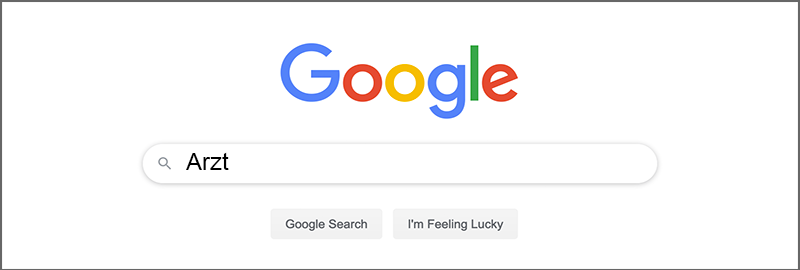
Is Google misogynistic? The ranking for certain keywords certainly provides grounds for this suspicion. However, the phenomenon of unequal treatment isn’t really the fault of the algorithms but is a fundamental problem with the German language. And those who want to can ensure for themselves that the results list is free from discrimination.
Sexist algorithms on the largest search engine? This statement attracts attention. There are actually studies which prove websites by women rank worse than those by men, for the simple reason that these lower ranked sites are operated by women. Those who are for example searching for a doctor using the German word “Arzt” tend to receive more sites for male physicians than females in the results list.
How is this possible in the age of equal rights? Ice-cold machine logic is to blame, but also the everyday use of the German language.
A fundamental criterion for Google’s ranking is how frequently a specific word appears in an online presence. And that’s precisely where it makes a difference if the robots more often find “Arzt” than “Ärztin” in the source text of an URL. The solution to this problem is less than satisfying:
For those doing the searching the problem can also only be remedied by making an additional effort:
In addition, this is also a problem in the opposite case. The search for an “Ärztin” relegates the male doctors to the lower rankings. This is actually understandable because someone searching for an “Ärztin” is usually only interested in finding a woman who operates a medical practice.
Someone searching specifically for a female physician has to actually go with the search term “Ärztin -Arzt”. Using the minus sign directly before a word excludes it entirely from a search. In doing so the user only excludes those female doctors who employ intelligent SEO though. Consequently, each “Ärztin” must decide for herself:
An inherent problem in the German language therefore becomes a challenge for Google programmers and a new revenue stream for SEO agencies.
It would present no technical problem for Google to simply put the terms “Arzt” and “Ärztin” on exactly equal footing. Until now the search engine has not done this for good reason; this solution would also hardly be more user friendly. Doing so would for example make the entry “Ärztin -Arzt” completely pointless.
The problem has little to do with sexism but a lot to do with mathematical set theory. Normally a male occupational designation also includes the female practitioners:
But the opposite of this is not true:
The male form of the word has an inclusive function and the female form an exclusive one. This is how we Germans understand our language, or it’s at least the way most speakers do. Since the 1970’s there have been many attempts to offset this linguistic injustice and inaccuracy.
To date no solution has been found that manages to avoid a logic snare and at the same time doesn’t offend the feeling of linguistic aesthetics. All copywriters who’ve been tasked to formulate a strictly gender neutral article, can tell you a thing or two about that. The result is either illogical, misogynistic or completely unreadable.
SEO experts recommend a fairly simple solution: the hyphen. A female copywriter, Texterin, becomes a Texter-in on her website, thus also including the male version of the word, Texter. While this is not allowed according to German orthography, it brings the Google search results list into a gender neutral balance. Regrettably though this doesn’t really help an Ärztin, because besides just adding “in” to the male form of the noun, the first letter of her occupation also receives an Umlaut, a German diacritical mark of two dots over a vowel that changes its pronunciation. If she calls herself an Arzt-in, then she looks dyslexic.
So, you can see that if a solution reveals itself for one instance, another problem is hiding just around the next corner. In practice the problem is not as grave as it initially appears, however. If you perform a test, it is quickly evident that the differences in results are indeed measurable, but not necessarily noticeable. In addition, the gender gap disappears almost entirely when the search is narrowed down by adding additional criteria.
Maybe artificial intelligence will bring the solution. Google is known to rely on AI when developing new search algorithms. Keywords retreat into the background and true search intentions come more and more to the foreground. In the near future then finding out to what extent the male or female form of a search term has relevance to the user will no longer be an issue. Then both Arzt and Ärztin will have completely equal opportunities on Google.